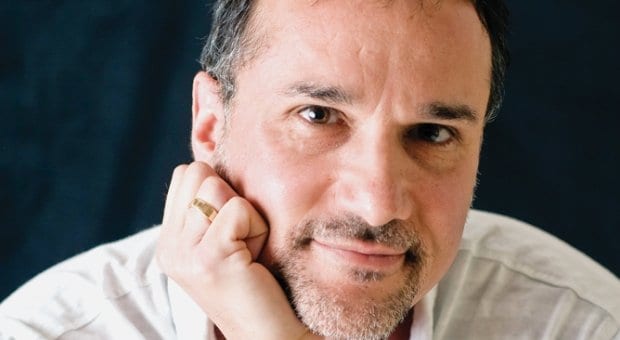When Kevin Connor comments in Scott Sherman’s debut mystery, First You Fall, that the sheets at the Astor Hotel have “a thread count three times higher than my hourly rate,” I assumed he was a detective, private or otherwise. I was wrong.
The first of many twists in Sherman’s three-part series soon reveals that Kevin has more in common with Tina Turner’s Private Dancer than Sam Spade. Which led me to wonder: has the author ever worked in the sex trade?
“I was propositioned once in my teens, standing on a street corner in Manhattan,” says Sherman, on the phone from Baltimore, Maryland. “A guy came up to me and said, ‘I have some spare change if you’re interested.’ That was the closest I came.”
Like a lot of men who trade sex for cash, it was never Sherman’s intention to become a mystery writer. But like a good detective, he looked at the facts: he wanted to publish a gay novel about a likable character that people would actually buy — and sex and mysteries sell.
A fan of the genre, Sherman didn’t think he could master “the intricate planning and plotting and thinking things out” attributed to a good mystery. Then he read Janet Evanovich’s best-selling Stephanie Plum mysteries and realized they were more funny and romantic than enigmatic.
“It all comes down to characters: if you like the characters you’ll always enjoy whatever you’re reading,” Sherman says. “Five years from now if I asked you about a book you’re reading, you’ll probably tell me about the characters, not about the plot.”
His Kevin Connor mysteries are chock full of them. From Kevin’s best friend, Freddy, armed with an arsenal of putdowns and pickup lines, to his neurotic Jewish mother (voted “most likely never to shut up”), plus a coterie of clients, Kevin is constantly distracted from piecing together clues to solve mysteries his closeted NYPD boyfriend, Tony, dismisses as an active imagination.
In Third You Die, the author hits his stride, blending intrigue, romance, humour, sex and violence into a satisfying story about people struggling to break free from the images others have created for them. Kevin’s search for a missing pornstar opens old wounds in his relationship with his boyfriend and addresses the ugly perception that anyone working in the sex trade is asking for trouble.
“There is a bias against sex workers in our culture, which I think is very unfair,” Sherman says. “There are people whom for various reasons, the only chance they have at a meaningful and successful sexual relationship is one in which cash is exchanged. That should not be stigmatized — I think that’s a shame.”
Sherman says he wanted to write a book that would inspire a young gay person to feel better about being gay. “I sort of learned how to be gay by reading books by Andrew Holleran and Larry Kramer,” he says. “Looking back, the characters were always miserable or came to some kind of horrible end.”
With Kevin, Sherman wanted to prove that you can be gay and still have adventures, a family and lead a productive life.
Kevin’s sexual escapades with his clients are generally played for laughs, but there is one scene in Third You Die that had me wiping the steam off my glasses.
In each of the books, homophobia is the bad guy. Whether it’s a gay character that’s repressed or a straight character that hates gay people, “homophobia is what Kevin is fighting against — without being preachy!”
Here the author hits his mark, as when Kevin observes, in Second You Sin, “Straight people hate us because we’re hedonists that just want to have sex or because we dare to be like them, wanting legal unions and to raise children.”
While the series succeeds in creating a compelling arc for Kevin as he transitions out of the sex trade, the one story line I struggled with was Kevin’s relationship with his boyfriend, Tony, who keeps one foot in the closet. In this day and age, what proud gay man has time for a closet case, especially in New York City?
Sherman says Tony symbolizes that gay people are constantly coming out of the closet. “It’s not like you come out once and it’s done,” he explains. “Every new job, every new doctor, is a decision. Raising two kids, I’m constantly getting it: ‘Daddy’s doing the shopping? Where’s Mommy?’ It’s hard.”
With Kevin’s story complete, Sherman is writing another book in the series from the perspective of Kevin’s best friend, Freddy. Whichever direction he takes the series, Sherman is well worth keeping an eye out for — private or otherwise.

 Why you can trust Xtra
Why you can trust Xtra


